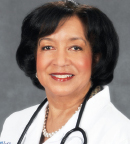
Edith Peterson Mitchell, MD
Edith Peterson Mitchell, MD, a leading researcher, medical oncologist, and proponent of combined-modality treatment, has been chosen as the 2017 American Society for Radiation Oncology (ASTRO) Honorary Member. Dr. Mitchell will receive this award—which is the highest honor ASTRO awards to distinguished cancer researchers and leaders in disciplines outside of radiation oncology, radiobiology, or radiation physics—at ASTRO’s 59th Annual Meeting in San Diego on September 26, 2017.
“Dr. Edith Mitchell has been a long-time proponent of combined-modality treatment—using chemotherapy and radiation therapy together to provide cancer patients with the best possible outcomes,” said ASTRO Chair David C. Beyer, MD, FASTRO. “Our specialty is privileged to have a champion such as Dr. Mitchell, who is a widely respected clinician as well as decorated military veteran. Her service to both our country and our field is laudable.”
Leadership and Research Roles
Dr. Mitchell is board certified in internal medicine and medical oncology and serves as Clinical Professor of Medicine and Medical Oncology at the Sidney Kimmel Medical College at Thomas Jefferson University in Philadelphia. She also serves as Associate Director for Diversity Programs and Director of the Center to Eliminate Cancer Disparities for the Sidney Kimmel Cancer Center at Jefferson. Additionally, Dr. -Mitchell served as the 116th President of the National Medical Association.
Her work on chemoradiation for gastrointestinal cancers has helped raise the profile of radiation oncology by providing clinical evidence of the merits of combined-modality treatment. Through the NRG Oncology/Radiation Therapy Oncology Group (RTOG), she has provided medical oncology leadership for prospective chemoradiation trials defining standards of care for gastrointestinal malignancies. As a result, Dr. Mitchell has authored several peer-reviewed publications on the RTOG trials 0012 and 0247.
“The RTOG trials helped break new ground for radiation oncology,” said ASTRO Immediate Past Chair Bruce D. Minsky, MD, FASTRO, who nominated Dr. Mitchell for this award. “Edith is a strong advocate and friend of radiation oncology. I can think of no other medical oncologist who has made more significant positive contributions to our community.”
She has also had leadership positions in trials examining breast, colon, and pancreatic cancers involving new drug evaluation and chemotherapy, development of new therapeutic regimens, patient selection criteria, and supportive care for patients with gastrointestinal cancer.
In her medical career, Dr. Mitchell has authored or coauthored more than 130 articles, book chapters, and abstracts on cancer treatment, prevention, and cancer control. She has served on several National Cancer Institute review panels, including the Clinical Trials and Translational Research Advisory Committee and the Blue Ribbon Panel convened to advise the National Cancer Advisory Board on former Vice President Biden’s National Cancer Moonshot Initiative. She was awarded the American Cancer Society’s Cancer Control Award for her significant commitment to research, education, and diversity.
Retired Brigadier General
Dr. Mitchell graduated from the Medical College of Virginia and completed her internship and residency at Meharry Medical College, followed by a fellowship in medical oncology at Georgetown University.
Dr. Mitchell received a commission through the Health Professions Scholarship Program in 1973 to join the Air Force while in medical school. She entered active duty after completing her fellowship at Georgetown. Dr. Mitchell is now a retired brigadier general, the first female physician to attain this rank in the history of the U.S. Air Force. Over her military career, she has been awarded more than 15 service medals and ribbons, including the Legion of Merit, Meritorious Service Medal, and Humanitarian Service Medal.
Dr. Mitchell said she is honored to receive the 2017 ASTRO Honorary Membership and looks forward to further research on combined-modality therapeutic interventions. ■

